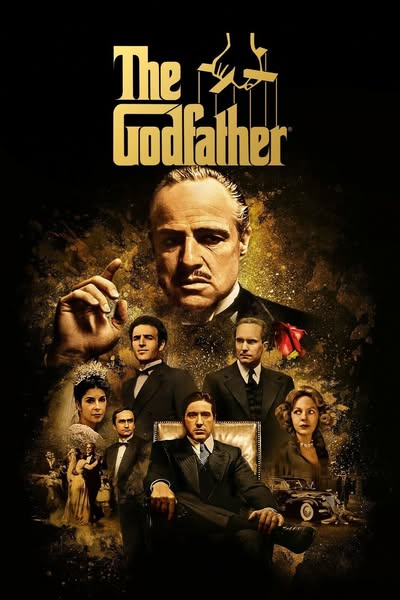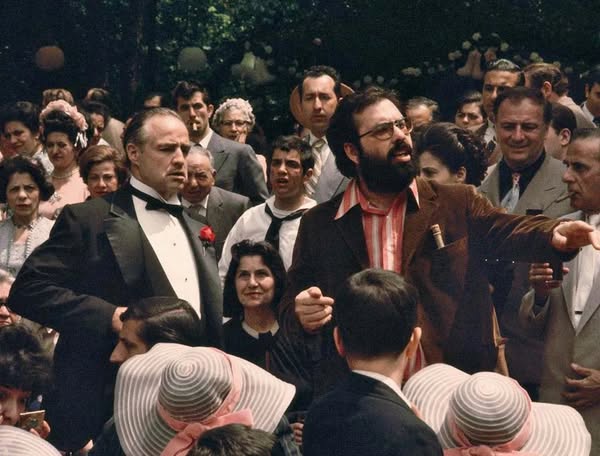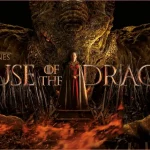The Godfather (1972)

The Godfather (1972) is widely regarded as one of the greatest films in cinematic history, a masterful blend of crime, drama, and family dynamics that explores the intricate world of organized crime in America. Directed by Francis Ford Coppola and based on Mario Puzo’s novel, the film offers a profound commentary on power, loyalty, and the American Dream, all set against the backdrop of the Mafia.
The story revolves around the powerful and influential Corleone family, led by patriarch Vito Corleone, portrayed brilliantly by Marlon Brando. As the head of a New York crime syndicate, Vito is a man of honor and respect, known for his shrewdness and ability to navigate the treacherous waters of organized crime. The film opens with the lavish wedding of his daughter, Connie, where we are introduced to the family and their close-knit relationships, establishing a sense of loyalty and tradition that underpins the narrative.
At the heart of the film is Vito’s youngest son, Michael Corleone, played by Al Pacino. Initially an outsider to the family business, Michael’s journey from a reluctant participant in his family’s affairs to a ruthless leader is one of the film’s central arcs. As violence erupts following an assassination attempt on Vito, Michael is drawn deeper into the world of crime, ultimately leading to a transformation that underscores the film’s exploration of morality and the costs of power.

The Godfather masterfully intertwines themes of family loyalty and betrayal. The relationships among the Corleone family members are complex and multifaceted, showcasing both the bonds of love and the brutal realities of their lifestyle. The film poignantly illustrates how the pursuit of power can corrupt even the most principled individuals, as Michael grapples with his identity and the legacy of his family. The iconic line, “I’ll make him an offer he can’t refuse,” epitomizes the moral ambiguity that permeates the film, challenging viewers to consider the lengths to which individuals will go to protect their loved ones and their status.
Coppola’s direction is notable for its meticulous attention to detail and atmospheric storytelling. The film is visually stunning, with its rich cinematography capturing the opulence of the Corleone family’s world juxtaposed against the gritty realities of their criminal enterprises. The use of lighting and shadow enhances the film’s mood, creating a sense of foreboding that mirrors the characters’ internal conflicts.

The score, composed by Nino Rota, is equally iconic, providing an emotional backdrop that resonates throughout the film. The haunting melodies evoke a sense of nostalgia and tragedy, reinforcing the themes of family and loss that underpin the narrative.
The performances in The Godfather are nothing short of extraordinary. Marlon Brando’s portrayal of Vito Corleone is legendary, earning him an Academy Award for Best Actor. His nuanced performance captures the complexity of a man who is both a loving father and a ruthless crime boss. Al Pacino’s transformation from the innocent Michael to a hardened leader is compelling, showcasing his range as an actor and making his character’s journey all the more impactful.

The supporting cast, including James Caan, Diane Keaton, and Robert Duvall, adds further richness to the story, each character contributing to the film’s exploration of loyalty, betrayal, and the moral dilemmas faced by those in power. Their interactions create a tapestry of relationships that highlight the film’s central themes, making the narrative resonate on multiple levels.
In conclusion, The Godfather is a cinematic masterpiece that transcends the crime genre to become a profound exploration of family, power, and morality. Through its intricate storytelling, exceptional performances, and stunning visuals, the film has left an indelible mark on the landscape of cinema. It invites viewers to reflect on the complexities of human nature and the often blurred lines between right and wrong. As a landmark film, The Godfather continues to influence filmmakers and remains a touchstone for audiences, illustrating the timeless struggle for power and the enduring bonds of family.











